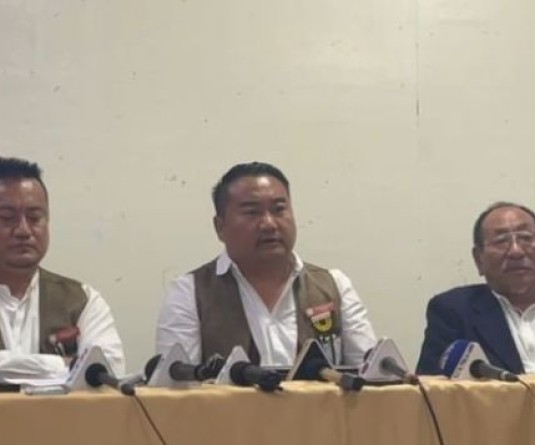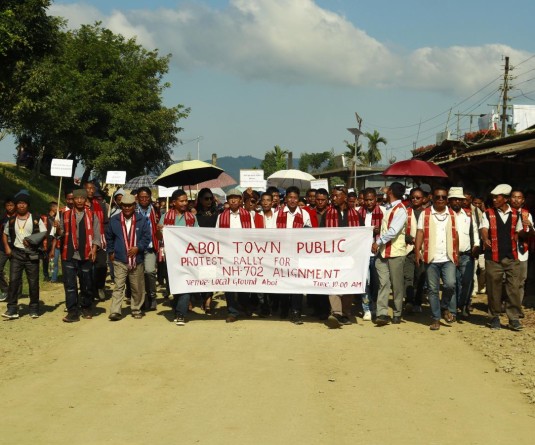A doctor tending to a patient at a government hospital in Tuensang. (Morung Photo by Moses Hongang Chang)
.jpg)
Moses Hongang Chang
Tuensang | July 2
Halfway into the second year of the COVID-19 pandemic, healthcare systems around the world continue to struggle in the combat against the pandemic. While the lack of economic sustainability has been a matter of concern for most healthcare systems, doctors in Nagaland’s Tuensang district shared that factors like stigmatization of COVID patients, hesitancy to seek medical help and shortage of workforce and necessary medical equipment, among others, continue to pose challenges in the healthcare delivery system.
Dr Toshi, a medical officer in Tuensang, shared that the fear of being infected by the COVID-19 virus has made people more apprehensive about seeking medical treatment. Even if their illness is not COVID related, they do not seek timely medical help and by that time they finally come for treatment, their illness becomes serious. He also said that, the fear is not all about the virus but people do not want to let their houses to be sealed if at all they are detected COVID positive, fearing stigmatization from the community.
He opined that the response of the state and centre government during this pandemic was quick whether it was in setting up the equipments, labs, mustering workforce, etc., and said that the government should learn a lesson from the pandemic on how government hospitals should function and keep trying to improve the health sector in the state.
Another medical officer, Dr Zerila underlined some of the challenge that the district is facing and said that there are not enough equipment, medicines for poor patients and other machines such as portable digital x-ray machines. “Those equipments are necessary not only for the COVID patients but also patients with other illnesses. Besides, we also need more doctors and right now we don’t have an anaesthetist which is very important,” she added.
She mentioned that help is extended to patients from poor economic backgrounds with the help of the poor patients fund or hospital welfare fund and they are also advised to apply for Ayushman Bharat which can help with their medical bills.
Dr Zerila added that the people should be empathetic towards each other and towards doctors and nurses who are experiencing stigma because of the pandemic. “The public should also understand that we are also humans and sacrificing a lot of things right now,” she added.
Elaborating on the challenges that the doctors are facing medical officer Dr Senilo stated that, “Shortage of medical supplies, lack of certain trained technical staff, outdated equipments, inadequate funds, poor road and IT connectivity with the state capital, inadequate and poorly maintained quarters,” were some of the hindrances in delivering quality healthcare. Another ‘extra burden,’ for doctors posted in rural places without government vehicles, is that one is compelled to bear and manage all the expenses from one’s pocket, he said, while adding that doctors especially in the outposts, carry the extra burden of manning the hospital in the absence of other doctors.
The first go-to-place for poor patients is the District Hospital since they are unable to bear the cost of travelling far for treatments. With the current pandemic situation, it has become a challenge not only for the people living in the remote areas but also for other patients as well as doctors to procure the best medical treatment and facilities unless the government hospitals are well equipped with all the latest and modern technologies. The shortage of workforce and necessary equipments in the Tuensang District Hospital has been lamented upon by the public for a long time.
“Patients bear the cost of procuring medicines, staffs are compelled to multitask reducing efficiency, unsatisfactory reports and outcomes which in turn discourages the staffs and patients, restricts the overall growth of the facility,” Dr Senilo said.
He appealed the public to be more supportive and appreciative especially towards those who are performing their duties with sincerity and to take ownership of the hospital and come forward to build it in concert with the concerned authorities and to create avenues for doctors to work comfortably and sincerely.
The government has still lot to do in terms of infrastructure, availing funds to procure the best machineries since most district hospitals in rural areas cater not only to one single town or village but the entire region of that particular district.
Suggesting measures that the government should take up in order to improve the health sector, Dr Senilo stated, “The government should provide quarters with adequate facilities, provide quality equipments and maintenance services, special allowances for those posted in remote places and those without government vehicles and to order medical supplies in concert with the hospital’s needs and requirement.”
“After all, in our current scenario there is no better place to serve the marginalized than in a government sector far away from the state capital,” he added.





